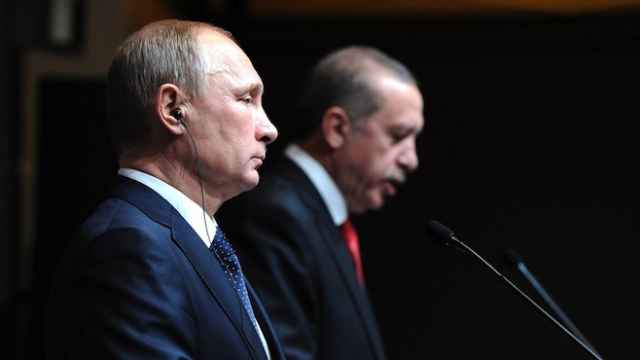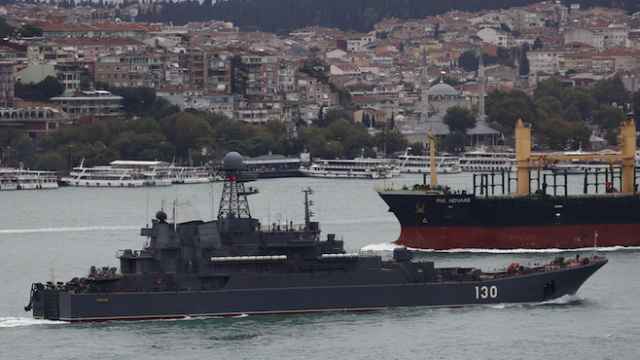Russia wants to keep good ties with Turkey, Kremlin spokesman Dmitry Peskov said on Thursday, after Ankara voiced its growing anger at Moscow's military intervention in Syria.
"As for the Russian air force operation in Syria, our actions in support of safeguarding Syria contribute to ensuring stability and security in the region sitting on Turkey's borders," Peskov told a call with journalists.
President Tayyip Erdogan, angered by Russian incursions into Turkish air space, has warned Russia there are other places Turkey could get natural gas and other countries that could build its first nuclear plant.
Russian aircraft twice entered Turkish air space at the weekend as Moscow carried out air strikes in Syria. Turkish F-16 jets have also been harassed by Syrian-based missile systems and unidentified planes since then.
"We can't accept the current situation. Russia's explanations on the air space violations are not convincing," the Turkish daily Sabah and other media quoted Erdogan as telling reporters as he flew to Japan for an official visit.
Russia's air strikes in support of President Bashar Assad's forces have shifted the balance of power in the Syrian conflict and dealt a blow to Turkey's aspirations of seeing Assad removed from power.
But beyond protesting, there is little Turkey can do.
Russia is Turkey's largest natural gas supplier, with Ankara buying 28-30 billion cubic meters (bcm) of its 50 bcm of natural gas needs annually from Russia. Other major suppliers are Iran and Azerbaijan, with a small amount planned from Turkmenistan.
Turkey commissioned Russia's state-owned Rosatom in 2013 to build four 1,200-megawatt reactors in a project worth $20 billion, although a start date for what will be Turkey's first nuclear power plant has not yet been set.
Erdogan said he was resentful over the Russian intervention in Syria, which Turkey sees as its own backyard, but did not currently plan to speak to President Vladimir Putin.
"These are matters for Russia to think about. If the Russians don't build the Akkuyu [nuclear plant] another will come and build it," he was quoted as saying.
"We are Russia's number one natural gas consumer. Losing Turkey would be a serious loss for Russia. If necessary, Turkey can get its natural gas from many different places."
There was no immediate reaction to his comments from Moscow.
"Not Realistic"
The inflexible nature of gas infrastructure means shifting from one supplier to another is not straightforward. Turkey imports Russian gas primarily through two pipelines, one passing through the northwestern region of Thrace, the other entering Turkey from under the Black Sea.
"Erdogan's statements on gas are not realistic at all. Turkey is dependent on Russia in the short and medium terms," said one private-sector gas official.
"No gas entry from Thrace means the end of Turkey as that gas pipeline feeds all of Istanbul and the Marmara region. There is no alternative pipeline system that can bring this gas."
Turkey could look to boost purchases of liquefied natural gas (LNG) from Nigeria and Algeria to plug a potential gas shortage, although that would be a costly option for a country whose annual energy imports bill already exceeds $50 billion.
It is already looking to increase gas imports from Turkmenistan, currently a marginal supplier, but energy analysts say Russia has blocked such moves. Erdogan is due to visit Turkmenistan on Monday.
The Trans-Anatolian Pipeline (TANAP), in which Turkey has a 30 percent stake, is expected to bring Turkey 6 bcm of Azeri gas but only after mid-2018 when the pipeline becomes operational.
Turkey's surplus in electricity generation means it can afford to live without a nuclear power plant for several years to come.
"Turkey is not dependent on nuclear energy right now," a Turkish energy official said. "There is an overcapacity in power right now, which will continue until 2020 … So if the nuclear plant is not built right away, that won't create a problem."
A Message from The Moscow Times:
Dear readers,
We are facing unprecedented challenges. Russia's Prosecutor General's Office has designated The Moscow Times as an "undesirable" organization, criminalizing our work and putting our staff at risk of prosecution. This follows our earlier unjust labeling as a "foreign agent."
These actions are direct attempts to silence independent journalism in Russia. The authorities claim our work "discredits the decisions of the Russian leadership." We see things differently: we strive to provide accurate, unbiased reporting on Russia.
We, the journalists of The Moscow Times, refuse to be silenced. But to continue our work, we need your help.
Your support, no matter how small, makes a world of difference. If you can, please support us monthly starting from just $2. It's quick to set up, and every contribution makes a significant impact.
By supporting The Moscow Times, you're defending open, independent journalism in the face of repression. Thank you for standing with us.
Remind me later.





